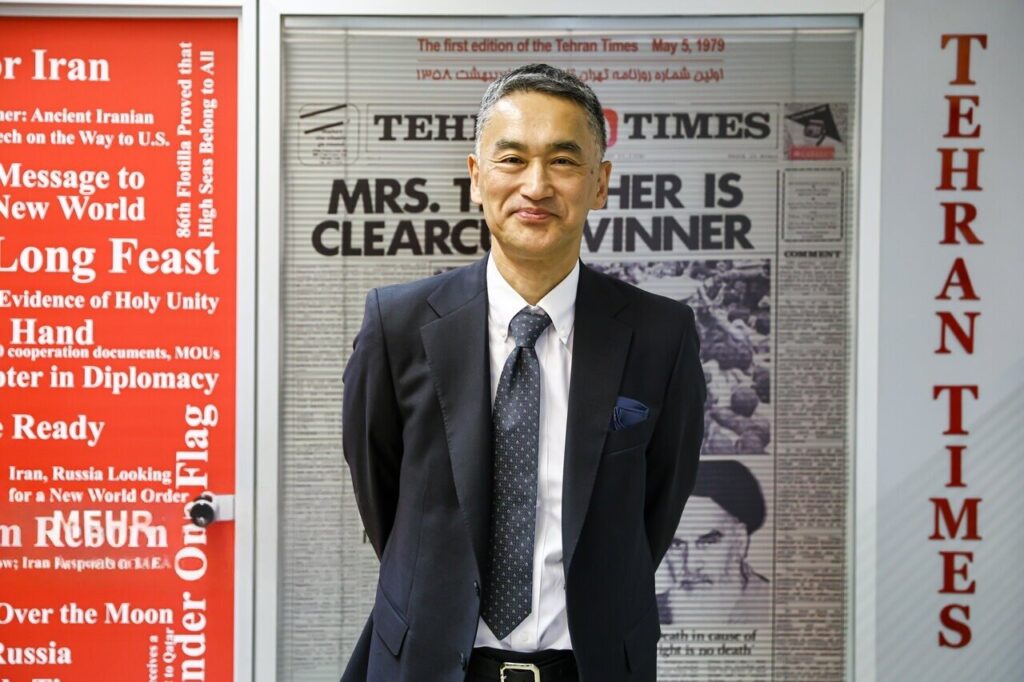Tehran – In an exclusive interview with the Tehran Times newspaper, his Excellency for the Japanese Ambassador, Mr. Tsukada, reflecting the longstanding friendship of Iran and Japan, highlighted mutual respect, shared strategic interests and the possibilities for expanded cooperation in various fields.
Below is the complete transcript of the interview.
How do you characterize the current state of relations between Japan and Iran?
I think the relationship between Iran and Japan is very warm and there is a great sense of respect for each other’s culture and civilization. These basic understandings and feelings define a very good, warm relationship between Iran and Japan.
What is Japan’s main interest in maintaining relations with Iran?
First of all, Iran is located in the Middle East region, and for Japan, the Middle East is an important region that depends on energy needs.
Energy security is therefore the fundamental factor that defines its relationship with the region, including Iran. Maritime security, which ensures a very smooth flow of energy between the Middle East and Japan, is also an important concern for Japan. Therefore, energy security and maritime security – these are important factors that we consider to be of important concern. And for that purpose, Iran is a very important country.
What is Japan’s official stance regarding the imposition of unilateral sanctions on Iran?
Well, first of all, international sanctions are the result of a long discussion of state actions and compliance with international rules and regulations.
Of course, there is no need to repeat the long history from the perspective of sanctions surrounding Iran. There is debate about the value or rationale for Iran’s nuclear development or nuclear program. The purpose, Iran’s intention, is developing private nuclear activities.
Countries have sovereignty to pursue a peaceful nuclear program. However, the reason for the imposition of international sanctions on Iran is because Iran was unable to convincingly demonstrate to the international community that Iran’s nuclear program or activity was purely for peaceful purposes. So I think there is still room for Iran to improve its accountability. At the same time, Japan and the international community are ready to work with Iran to ensure that Iran can prosper and live in a peaceful environment. We hope Iran can prove to the international community that the nuclear program is a peaceful purpose so that sanctions are lifted.
For example, are there specific sectors like technology or infrastructure? Is Japan particularly interested in expanding its economic cooperation with Iran?
Well, first of all, we need to improve our external environment in order to restore our economic relationship to its full height or full potential. IE, sanctions will be removed. Based on that, I think there are many areas in which Japanese businesses are very interested in exploring. For example, infrastructure rehabilitation, particularly petrochemical plants, or utility infrastructure such as power generation and water.
In trade there is a large market and strong demand for Japanese cars, and is ready to export if conditions allow. I am also interested in decarbonisation of the economy and industry in general.
These include areas such as energy efficiency and the hydrogen industry. These are some examples. Of course, there are many advantageous sectors.
As far as Japanese companies are concerned, these are areas where we prepare to participate when the conditions allow.
Is there an active cultural exchange program between Japan and Iran? If so, can we provide some examples?
Generally speaking, I would say that in the field of culture, especially popular culture, it should be personal driven or business driven. There is little room for government intervention. That’s why many exchanges have already been made. For example, anime, games, literature, and films. From a pop culture and contemporary culture perspective, I think people are already exposed to each other’s traditions. So I’m not worried about such exchanges continuing.
If there is a role that helps governments to encourage cultural exchange, it is in the field of maintaining their historical heritage. Archaeology is one such example.
We would like to support areas where government intervention and support is needed. As we celebrate the 100th anniversary of diplomatic relations, 2029 will be an ideal opportunity to reconsider, rediscover and think ahead of time about our history and bilateral exchange.
We would like to explore areas where two governments can employ leaders to explore new fields of cultural exchange.
What is the level of tourism in Japan towards Iran? And, in your opinion, how can we encourage that even more?
Frankly, the level of tourism, especially tourists from Japan to Iran, is minimal for many reasons. There is no direct flight between Iran and Japan. There are also inconveniences in foreign exchange, communications and transportation services. Hospitality services such as restaurants and hotels are the international standard range for first-time visitors in major tourist destinations. The lack of basic infrastructure and logistics is preventing Japanese tourists from coming to Iran.
However, in general terms, I think there is a great deal of potential and interest in the Iranian tourism market. Iran has beautiful natural scenery, rich cultural heritage, interesting local attractions, cultural and regional diversity, and fascinating cuisine. We believe we can work together to make the most of these benefits and capabilities that Iran has to offer.
Lastly, what is your personal vision for the future relationship between Iran and Japan?
I am extremely optimistic given the deep and rich cultural and civilized connections we enjoy.
There is a strong interest in both sides to learn more about each other. Hopefully, the external environment will improve and economic activity will return to its previous state. This provides the foundation for much greater activities to take place.

